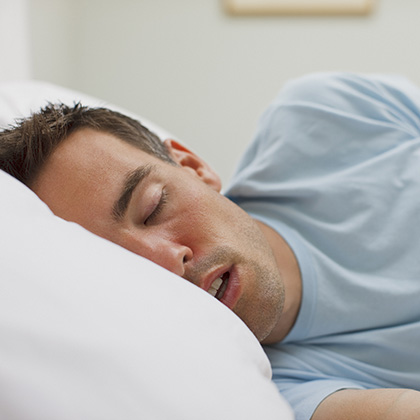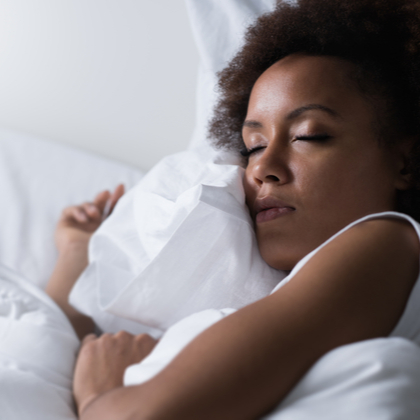If you often feel sleepy during the day and wake up feeling unrefreshed – and especially if you’ve been told you’re a loud snorer – there’s a chance you may have a condition called obstructive sleep apnoea (OSA, also often called obstructive sleep apnoea syndrome or OSAS).
OSA is a condition where your breathing stops briefly while you’re asleep because of an airflow problem. Your breathing may stop completely for 10 seconds or more (apnoea), or your breathing becomes abnormally slow and shallow for 10 seconds or more as a result of your airflow being reduced by 50 percent (hypopnoea). Either of these can affect you throughout the night, with severe cases involving blocked or reduced breathing once every one or two minutes.
Some people may experience both apnoea and hypopnoea during the night, which doctors describe as obstructive sleep apnoea/hypopnea syndrome (OSAHS).
Signs and symptoms
It’s not always obvious if you have OSA, since you may not remember having breathing difficulties or waking up while you’re asleep, especially if you’re a deep sleeper. So many cases of OSA are often first picked up by a partner or family member who may notice one or more of the following:
-
You snore loudly.
-
Your breathing is noisy and may seem forced.
-
You have periods while you’re asleep when you stop breathing, or your breathing is interrupted by gasping or snorting.
Some of the things you may notice include feeling sleepy or irritable frequently during the day, waking up still feeling tired, feeling restless during the night, having night sweats, waking up to go to the toilet several times during the night, waking up gasping for breath, having difficulties with concentration during the day, waking up with a headache, having a reduced sex drive and feeling low or depressed.
How many people are affected?
According to the Sleep Apnoea Trust Association, estimates suggest that up to 13 percent of adult men and six percent of adult women in the UK are affected by OSA (i). You’re more likely to have OSA if you’re a middle-aged man who is overweight or obese (though men and women who aren’t overweight can be affected too) (ii). The typical person with OSA, says the Sleep Apnoea Trust Association, is a middle-aged man who snores and takes a size 17 collar or higher (i) (excess fat around the neck may be a contributing factor because it puts extra pressure on the airways).
Some children are affected too, often those with enlarged tonsils or adenoids (soft tissue at the back of the throat). Other things that may increase the risk of OSA include drinking alcohol at night (alcohol relaxes the muscles in the throat more than usual), taking sleeping pills or other sedative drugs, having a small or receding lower jaw, having nasal congestion or a blocked nose caused by a deviated septum or nasal polyps, and sleeping on your back rather than on your side.
If you have Type 2 diabetes and/or related metabolic conditions such as insulin resistance or glucose intolerance, you’re also more likely to have OSA. Some people find the condition runs in their family, while smokers can have a higher risk of OSA too.
According to the British Lung Foundation, while OSA may be common, it’s also under-diagnosed. One of the charity’s surveys even suggests that 85 percent of people who were later diagnosed with OSA had previously seen their GP about their symptoms, with 11 per cent told not to worry with no action taken (iii).
The number of people worldwide with OSA is increasing too, with some experts believing this is linked to rising obesity figures (around four percent of middle-aged men and two percent of middle-aged women are currently thought to have OSA in Western countries (iv)).
Other sleep breathing disorders
There are a couple of other types of sleep-related breathing disorders (OSA is the most common):
Central sleep apnoea
CSA is where the brain fails to send the correct signals to the breathing muscles rather than there being a physical obstruction to breathing. Typically it makes you stop breathing for a few seconds before you wake up and start breathing again.
Mixed sleep apnoea
Also called complex sleep apnoea, mixed sleep apnoea is a combination of obstructive sleep apnoea and central sleep apnoea.
What happens in OSA?
When you sleep, it’s normal for the muscles and soft tissues in the throat to relax and collapse to some degree without it causing any breathing problems. But if the muscles narrow too much, it can cause snoring.
If the muscles collapse to an extent where your throat becomes completely closed, the flow of air down your airway stops, and you stop breathing.
This break in your breathing makes the oxygen level in your blood start to plummet. Your brain is alerted to the lowering oxygen level and wakes you up. Once awake, you may gasp or grunt and take some deep breaths, then start breathing again normally. Some people realise they’ve woken up, while others go back to sleep again and have no recollection of waking the next day. Either way, waking up throughout the night means you’re probably not getting the quality of sleep that you need.
Experts believe an occasional apnoea while you sleep is common. But those with OSA have many apnoea episodes a night, some may even have hundreds:
-
Mild OSA is usually when you have between five and 30 episodes of apnoea an hour.
-
Moderate OSA is usually when you have between five and 14 episodes of apnoea an hour.
-
Severe OSA is more than 30 episodes an hour.
If you’re one of the many people who isn’t aware of having breathing difficulties while you sleep, your sleeping partner may notice that your breathing stops, followed by a loud snore, gasp or snort. This can be quite alarming, as it can sound as if you’re choking in your sleep.
OSA and driving
A serious consequence of having OSA is that it can affect your ability to drive safely. Tiredness can affect your hand-eye co-ordination and reaction speed, not to mention your risk of falling asleep at the wheel – which goes some way to explaining why tiredness is responsible for around 20 percent of road accidents (v).
Indeed there’s much evidence to suggest that drivers with OSA have a higher number of car crashes than other drivers. According to the NHS, drivers with OSA may be up to 12 times more likely to be involved in a car accident than the average person (vi). The driving charity Brake even suggests people with OSA may be more dangerous on the roads than those who have been drinking and driving (vii).
Falling asleep at the wheel and causing an accident is a criminal offence and may lead to a prison sentence. However the reason for falling asleep doesn’t have to be OSA – it can be anything that causes sleepiness, such as not having enough sleep because there’s a new baby in your household, or lack of sleep caused by stress.
Legal considerations
However, since there’s a known link between increased accident rates and OSA, drivers who are affected have a legal obligation to inform the Driver and Vehicle Licensing Agency (DVLA) if their condition might have an impact on their ability to drive safely (viii).
On the other hand, you don’t usually have to inform the DVLA if you have sleep apnoea but you’re not affected by daytime sleepiness to such an extent that it affects your driving.
In other words, not everyone with OSA has to stop driving until their symptoms are under controlled. If you’re not sure whether this affects you, your GP or sleep specialist can advise you and let you know whether or not you need to inform the DVLA about your condition.
If you’re not sure, your GP or sleep specialist can advise you and let you know whether or not you need to inform the DVLA about your condition.
The most important thing to remember, whether you have OSA or not, is that you shouldn’t drive if you’re feeling sleepy. The Highway Code states you shouldn’t begin a journey if you’re tired, and that you should get a good night’s sleep before embarking on a long journey (ix). Plan your journey to take sufficient breaks – at least 15 minutes after every two hours of driving is recommended. If you do feel sleepy, stop in a safe place and have two cups of caffeinated coffee and take a short nap for at least 15 minutes.
*For more information about driving with, download this leaflet from the DVLA.
Treating OSA
Besides the risk of having a road accident there are several other potentially serious complications of OSA if it’s left untreated, including the following:
-
High blood pressure
-
Heart attack
-
Stroke
-
Congestive cardiac failure
-
Type 2 diabetes
-
Depression and other mental health problems
If you suspect you have OSA – or your partner has told you they’ve noticed you’ve been having breathing difficulties during your sleep – it’s important to see your GP. OSA can be diagnosed in several ways. You may be referred to a hospital specialist and you may even have to spend the night at a sleep clinic, where your sleep quality will be monitored (this may involve having a polysomnography, an investigation that monitors several things such as brain wave activity, muscle tone, airflow, chest and abdomen movements, heart rate and blood oxygen levels).
Sleepiness rating
If you have suspected OSA one of the first things you may have to do is complete a questionnaire that assesses your score on the Epworth Sleepiness Scale (this determines how much you’re affected by daytime sleepiness). The questions include how likely you are to fall asleep in different situations – including sitting and reading, watching TV and after lunch without having alcohol – with a high score suggesting you need medical attention.
Once diagnosed, there are several treatment options that may help:
-
A CPAP (continuous positive airway pressure) device is a nasal or facial mask you wear overnight that delivers a continuous supply of compressed air to your airways. The mask should be worn for at least four hours a night. It’s thought to be highly effective for OSA, but can cause unwanted side effects such as claustrophobia, rhinitis, nasal irritation and can also disturb your sleeping partner.
-
Mandibular advancement devices (MADs) look like gum shields that sports people wear in their mouths to protect their teeth and gums. They work by holding your jaw and tongue forward so that your throat doesn’t become too narrow while you’re asleep, and are often recommended to those with mild OSA and people with OSA who can’t tolerate a CPAP device. MADs are available online and at pharmacies, or your dentist may be able to make one especially for you (bespoke MADs are thought to be more effective (x)).
-
Surgery for OSA is usually only recommended for those with severe OSA who haven’t been helped by – or haven’t been able to tolerate - CPAP devices or MADs. Various procedures may be considered, including uvulopalatopharyngoplasty (either with or without a laser), surgery to bring the jawbone forward, tonsillectomy and radiofrequency ablation of the tongue base.
Other treatments, including drugs, nasal dilators and apnoea-triggered muscle stimulation devices are sometimes used, though they aren’t generally recommended for OSA. One thing you could try, however, is sleeping on your side (try using pillows to keep you in the correct position, or the old wives’ solution of sewing tennis balls into the back of your night clothes to stop you rolling onto your back in your sleep).
How to help yourself
As well as having conventional treatment, there are several things you can do to help yourself if you have OSA.
Lose weight
According to the British Lung Foundation, estimates suggest around half of all people with OSA are overweight and approximately 40 percent of people who are living with obesity have OSA, as well as 77 percent of people living with morbid obesity (iii).
So it should be no surprise to learn that if you’re overweight or obese, losing weight will almost certainly help improve your OSA symptoms. Some experts even recommend bariatric surgery in cases of OSA caused by severe obesity (xi).
Read our article for more information on weight loss.
Stay physically active
Being active is good for your health and can help you keep your weight down. Aim for at least 150 minutes of moderate-intensity exercise each week (a 30-minute session five times a week is often recommended). Moderate-intensity exercise will increase your body temperature and your heart rate, and make you breathe more heavily. Try to be active earlier in the day rather than later, as too much exercise at night can interfere with your ability to sleep.
Give up smoking
Smoking may damage your airways, which might affect whether or not they’re likely to collapse when you’re sleeping. If you need help with giving up smoking, start by clicking here. Find more help and support on giving up smoking in our Pharmacy Library.
Avoid alcohol
It’s also a good idea to avoid drinking alcohol during the evening, as alcohol makes the muscles around the upper throat relax more than usual (this explains why people who tend to snore loudly while they’re asleep after drinking excessively). The UK Chief Medical Officers recommend not regularly drinking more than 14 units of alcohol a week, spread evenly over three or more days.
Avoid tranquillisers
Sleeping pills, sedatives and other tranquillisers have a similar effect on your throat muscles as alcohol (see above). So while you may think you’re getting a good night’s sleep after taking them, they could be causing problems with your breathing.
Exercise your throat
Singing may help strengthen the muscles and tissues in your throat, and prevent them from getting too flabby. This, in theory, may make the airways in your throat less susceptible to collapsing at night. One study even suggests that daily singing exercises not only reduces the severity, frequency and loudness of snoring, but also improves the symptoms of mild to moderate OSA (xii). Another survey agrees that singing exercises may help with snoring (xiii).
Take magnesium
While there’s no evidence that magnesium helps with OSA directly – though one study suggests people with OSA have lower-than-average magnesium levels (xiv), this essential mineral is needed by the body to regulate muscle functioning. Many adults in the UK are thought to have low magnesium levels, so it may be worth trying a magnesium supplement. Alternatively you can find magnesium in foods such as wheat bran, wheat germ, almonds, cashews, soya beans, bran flakes, peanut butter, brown rice, lentils and kidney beans.
We know that managing OSA can be difficult, but this guide should help make it a little easier. You can discover more articles on a range of other health conditions in our health library.
References:
-
Available online: http://www.sleep-apnoea-trust.org/sleep-apnoea-information-patients/sleep-apnoea-frequently-asked-questions/
-
Available online: https://patient.info/signs-symptoms/tiredness-fatigue/obstructive-sleep-apnoea-syndrome
-
Available online: https://www.blf.org.uk/sites/default/files/OSA_Toolkit_2015_BLF_0.pdf
-
Available online: https://patient.info/doctor/obstructive-sleep-apnoea-syndrome-pro
-
Available online: https://www.rospa.com/Road-Safety/Advice/Drivers/Fatigue/Road-Accidents
-
Available online: https://www.nhsinform.scot/illnesses-and-conditions/lungs-and-airways/obstructive-sleep-apnoea
-
Available online: http://www.brake.org.uk/wake-up/15-facts-a-resources/facts/486-sleep-apnoea
-
Available online: https://www.gov.uk/sleepiness-and-driving
-
Available online: https://www.highwaycodeuk.co.uk/rules-for-drivers-and-motorcyclists-fitness-to-drive.html
-
Available online: https://patient.info/signs-symptoms/tiredness-fatigue/obstructive-sleep-apnoea-syndrome#nav-5
-
Dong EZ. et al., Weight loss surgery for obstructive sleep apnoea with obesity in adults: a systematic review and meta-anaalysis protocol. BMJ Open. 2018 Aug 29;8(8):e020876. Available online: https://www.ncbi.nlm.nih.gov/pubmed/30158220
-
Hilton. MP, et al.Singing Exercises Improve Sleepiness and Frequency of Snoring among Snorers – A Randomised Controlled Trial. IJOHNS Vol. 2. No. 3. May 2013.
-
Ojay. A, Ernst. E, et al.Can singing exercises reduce snoring? A pilot study. CompTherinMed. Vol. 8. Iss. 3. Sep 2000. 151-156.
-
Karamanli H. et al., Serum levels of magnesium and their relationship with CRP in patients with OSA. Sleep Breath. 2017 May;21(2): 549-556. Available online: https://www.ncbi.nlm.nih.gov/pubmed/27600660
Related Posts
Disclaimer: The information presented by Nature's Best is for informational purposes only. It is based on scientific studies (human, animal, or in vitro), clinical experience, or traditional usage as cited in each article. The results reported may not necessarily occur in all individuals. Self-treatment is not recommended for life-threatening conditions that require medical treatment under a doctor's care. For many of the conditions discussed, treatment with prescription or over the counter medication is also available. Consult your doctor, practitioner, and/or pharmacist for any health problem and before using any supplements or before making any changes in prescribed medications.

Christine
Christine Morgan has been a freelance health and wellbeing journalist for almost 20 years, having written for numerous publications including the Daily Mirror, S Magazine, Top Sante, Healthy, Woman & Home, Zest, Allergy, Healthy Times and Pregnancy & Birth; she has also edited several titles such as Women’ Health, Shine’s Real Health & Beauty and All About Health.
View More



